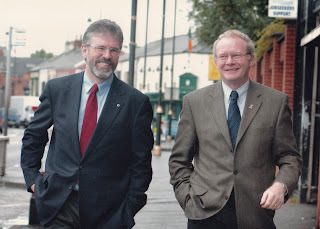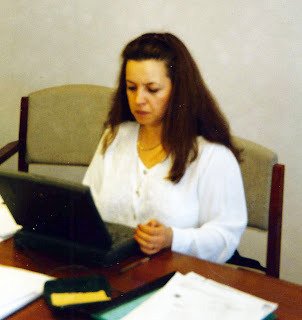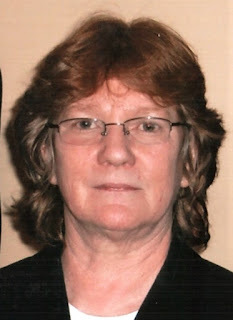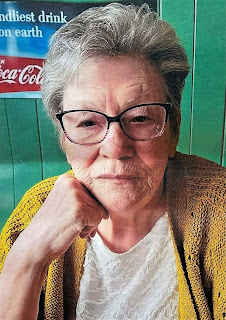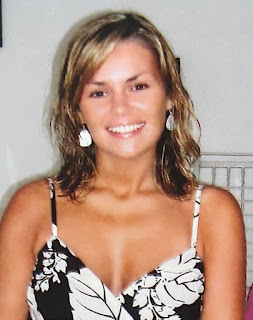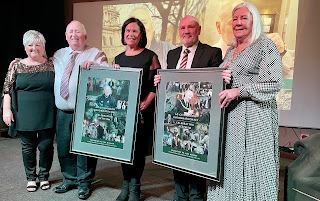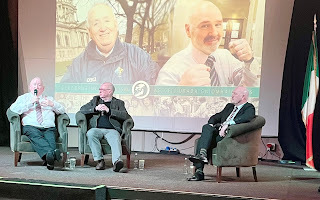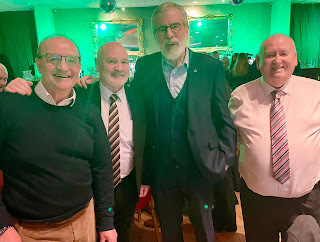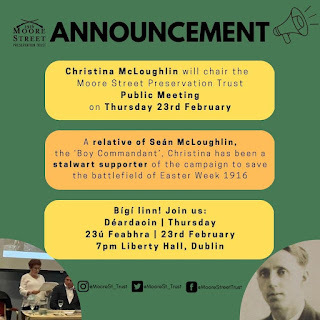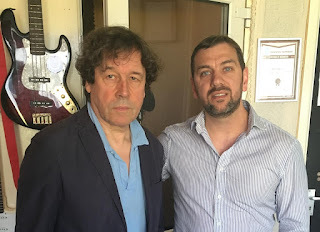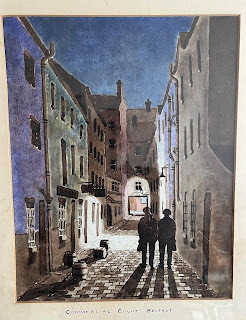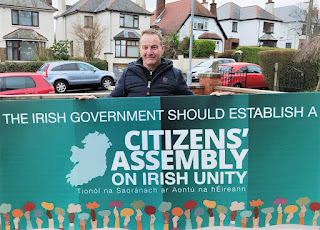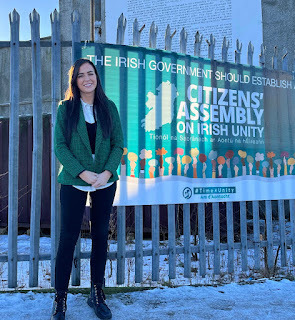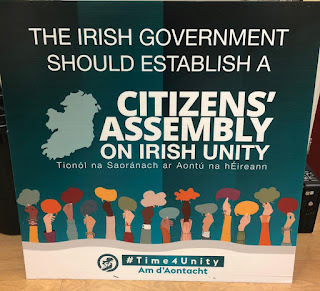Gerry Adams's Blog, page 13
March 27, 2023
Talking about Martin McGuinness: Beauty an Oile��in: The Good Friday Agreement and Sue Ramsay
Talking about Martin McGuinness
Tuesday was the sixth anniversary of the death ofmy friend and comrade Martin McGuinness. I travelled to the Derry City Hotelthat evening for a public conversation about my relationship with Martin withRoy Greenslade. Roy is an author, broadcaster and journalist who during a longand distinguished career has held a series of senior positions in many ofLondon���s main newspapers.
I recalled meeting Martin in Dublin and then behindthe barricades in Derry in 1972 as we prepared to travel to London for secretmeetings with the British government. It would have been understandable if a 22year old working class lad from the Bogside was stressed and anxious about theprocess he was about to engage in but not Martin. He was in control ��� calm,confident, a natural leader ��� wanting to talk about how we should approach theupcoming engagements with British Ministers ��� our agenda, proposals, bottomline.
The Martin McGuinness Peace Foundation was established in 2019 as a not-for-profitcharity. Its purpose is to celebrate the life, work and achievements of MartinMc Guinness, as a leader, a political activist and aninternational statesperson. It does this by promoting his progressiveideals of: national reconciliation, unity and peace; of conflictresolution and peace building.
All of these ideals were at the heart of everythingMartin tried to do as a political leader and in his work in the Office of Firstand Deputy First Minister with Ian Paisley, Peter Robinson and Arlene Foster.
Tuesday���s event was really good. I enjoyed talkingabout my friend. I hope all those who were there enjoyed it also. Thank you Royfor moderating our discussion.
The Martin McGuinness Foundation is holding itsannual New York dinner in Rose O���Grady���s on 7th Avenue on 4 April. Ihave been asked to speak so see you there.
Beauty an Oile��in
Regular readers will knowthat I am a big fan of Claddagh Records. Founded by Garech Browne and IvorBrowne, for decades Claddagh has been recording and promoting Irish traditionalmusic and song. This wonderful enterprise has recently had a new lease of lifeand Claddagh is currently digging into its archival material and giving itscollections space to breathe once again. As the result of an arrangement withUniversal Music these gems from our tradition are now getting global exposure.Well done Claddagh.
One such production isBeauty An Oile��in ��� Music and Song of The Blasket Islands. I treated myself toa Saint Patrick���s Day present during a recent visit to An Culturlann onBelfast���s Falls Road and I am delighted that I did. Beauty An Oile��in is areally fine bi lingual hard backed book filled with notes and interesting information. It also contains a CD of twenty six recordings. Someare quite short ��� snatches of seisi��ns ��� others complete renditions oftunes or songs from se��n n��s singers and musicians. Treasures all. Manycollected by R��onach u�� ��g��in in situ. We are indebted to R��onach.
The Blasket Islands arespecial. There are six main islands, west of the Dingle peninsula in Kerry.They are uninhabited these days but once a thriving Irish speaking communitylived there. They were hardy folk as island people must be. Three books broughtthem to the attention of the rest of us. An tOile��nch , Fiche Blian ag F��s andPeig. Tom��s �� Criomhthain gave us the first one, The Islandman.Muiris �� S��illebh��in gave us Twenty Years A Growing and Peig came fromPeig Sayers. Published ninety years or so ago these books give an insight intothe life of a of a unique island community. Many other books have been writtensince then but one thing is clear. Music and song were part of life for theislanders.
So was dancing and storytelling.
As Beauty AnOile��iIn puts it. ���It (music) was an expression of feeling, both joyand sorrow, and this musical expression drew on, and reinforced, island cultureand tradition. Music served as a cohesive force within the community.���
One of my favourite of allour traditional airs is the Blasket one, Port na bP��cai. This is a tunewhich came in on the wind off the Great Blasket. I first heard it from theplaying of Tony MacMahon. In Conway Mill one night he made the hair on the backof my neck stand up as he bewitched us with this plaintive tune. SeamusHeaney���s fine poem The Given Note captures and evokes the essence ofthis music of the p��ca or ghost. The Poet and The Piper, another Claddaghproduction, features Seamus reading his poem and master piper, Liam O Flynn andhis version of Port na bPucai. Well worth listening to as is Martin Hayesversion.
Beauty An Oile��n gives usthe story of the origins of Port na bP��cai as well as a lilting version byMuiris O Dalaigh.
Other modern musicians andsingers feature including the mighty Breannd��n �� Beaglaoich and Aoife andDeirdre Granville and R��is��n N�� Ch��ileachair, all influenced by theirisland connections. Let���s give the last word to R��onach u�� ��g��in.���The tunes and songs on this CD continue to be played and sung.���
Isn���t it wonderful thatthis is so? Long may it continue.
BEAUTY AN OILE��IN. MUSICAND SONG OF THE BLASKET ISLANDS. CLADDAGH RECORDS. Claddaghrecords.com
Siobhan O'Hanlon in Castle Buildings
The Good Friday Agreement and Sue Ramsay
In other columns Gerry Kelly and Bairbre de Br��nhave recalled their experiences in the negotiations leading to the Good FridayAgreement. This week Sue Ramsay remembers:
Following the elections to the Forum, my goodfriend and comrade the late Siobh��n O'Hanlon asked me to provide administrative support to the party at CastleBuildings where the negotiations were to take place. At that time I was a localCouncillor on Lisburn Council and was also working in the office of the 6county Cuige.
Our first few weeks in Castle Building were spentgetting the offices set up. Sorting out passes for the party delegation.Getting to know the civil servants and support and security staff. Otherparties were doing the same. But more importantly we were tasked with breakingdown the barriers with all of those who worked there.
Every day I made a point of saying good morning orhello to anyone I met including the kitchen staff, cleaners and other partystaff. Usually I got a mixed response - some nods, some smiles but a fair fewgrunts. But after awhile this began to change, especially amongst the staff.Siobhan and I got to know some of them really well.
Sometimes when things were quiet in the office Iwould take a dander around the building and have tea with the staff or if I wasreally bored I would help by washing the dishes because anyone who knows meknows that I always get up to mischief when I'm not busy.
A few weeks before the negotiations concluded andthe Good Friday Agreement achieved I was in the office minding my own businesswhen in walks the British Secretary of State, Mo Mowlam looking for MartinMcGuinness. I said he was away talking to someone. So off comes her shoes andwig ��� she was undergoing radiation treatment and had lost her hair - and shegave her head a good scratch.
As usual around Easter time republicans wear theEaster Lily to remember Ireland���s patriot dead. I had mine on. Mo asked meabout it and I told her that it is to remember everyone who had died.
���Do you want one��� I asked.
���Yes��� she said and pinned it to her top.
So, shoes and wig go back on and she leaves theoffice. Two minutes later Martin comes in and leaves the Easter Lily back on mydesk, shakes his head and smiles. I heard later that Mo was on her way to meetthe Ulster Unionist Party. Martin bumped into her en route and diplomaticallyremoved the Lily. Jesus, imagine David Trimble���s reaction if she had still hadit on.
But sure I never learn. Late on the Thursday goinginto the Good Friday morning the phone rings I answer it. This woman with anAmerican accent says she is phoning from the situation room in the White Housefor President Clinton and is looking to speak to Gerry Adams. I thought it wasone of my friends Geraldine Crawford, who was part of our support team, windingme up.
So I said ���aye dead on Geraldine do you think I'mstupid?���
The woman paused and said ���Excuse me this isPresident Clinton���s office looking to talk to Mr Adams.���
The penny dropped. I had nearly derailed the peaceprocess a second time.
Two months later the election to the Assembly tookplace. I was selected to be one of the Sinn F��in candidates. The party won fourof the six seats ��� Gerry Adams, Bairbre de Br��n, Alex Maskey and myself. It wasan exciting time and I remained an MLA until 2014 when I had to stand down dueto ill health.
I have a few other funny stories but I think I will wait until the 50anniversary before I tell them that way I will be far too old to get shoutedat.
Talking about Martin McGuinness: Beauty an Oileáin: The Good Friday Agreement and Sue Ramsay
Talking about Martin McGuinness
Tuesday was the sixth anniversary of the death of my friend and comrade Martin McGuinness. I travelled to the Derry City Hotel that evening for a public conversation about my relationship with Martin with Roy Greenslade. Roy is an author, broadcaster and journalist who during a long and distinguished career has held a series of senior positions in many of London’s main newspapers.
I recalled meeting Martin in Dublin and then behind the barricades in Derry in 1972 as we prepared to travel to London for secret meetings with the British government. It would have been understandable if a 22 year old working class lad from the Bogside was stressed and anxious about the process he was about to engage in but not Martin. He was in control – calm, confident, a natural leader – wanting to talk about how we should approach the upcoming engagements with British Ministers – our agenda, proposals, bottom line.
The Martin Mc Guinness Peace Foundation was established in 2019 as a not-for-profit charity. Its purpose is to celebrate the life, work and achievements of Martin Mc Guinness, as a leader, a political activist and an international statesperson. It does this by promoting his progressive ideals of: national reconciliation, unity and peace; of conflict resolution and peace building.
All of these ideals were at the heart of everything Martin tried to do as a political leader and in his work in the Office of First and Deputy First Minister with Ian Paisley, Peter Robinson and Arlene Foster.
Tuesday’s event was really good. I enjoyed talking about my friend. I hope all those who were there enjoyed it also. Thank you Roy for moderating our discussion.
The Martin McGuinness Foundation is holding its annual New York dinner in Rose O’Grady’s on 7th Avenue on 4 April. I have been asked to speak so see you there.
Beauty an Oileáin
Regular readers will know that I am a big fan of Claddagh Records. Founded by Garech Browne and Ivor Browne, for decades Claddagh has been recording and promoting Irish traditional music and song. This wonderful enterprise has recently had a new lease of life and Claddagh is currently digging into its archival material and giving its collections space to breathe once again. As the result of an arrangement with Universal Music these gems from our tradition are now getting global exposure. Well done Claddagh.
One such production is Beauty An Oileáin – Music and Song of The Blasket Islands. I treated myself to a Saint Patrick’s Day present during a recent visit to An Culturlann on Belfast’s Falls Road and I am delighted that I did. Beauty An Oileáin is a really fine bi lingual hard backed book filled with notes and interesting information. It also contains a CD of twenty six recordings. Some are quite short – snatches of seisiúns – others complete renditions of tunes or songs from seán nós singers and musicians. Treasures all. Many collected by Ríonach uí Ógáin in situ. We are indebted to Ríonach.
The Blasket Islands are special. There are six main islands, west of the Dingle peninsula in Kerry. They are uninhabited these days but once a thriving Irish speaking community lived there. They were hardy folk as island people must be. Three books brought them to the attention of the rest of us. An tOileánch , Fiche Blian ag Fás and Peig. Tomás Ó Criomhthain gave us the first one, The Islandman. Muiris Ó Súillebháin gave us Twenty Years A Growing and Peig came from Peig Sayers. Published ninety years or so ago these books give an insight into the life of a of a unique island community. Many other books have been written since then but one thing is clear. Music and song were part of life for the islanders.
So was dancing and story telling.
As Beauty An OileáiIn puts it. ‘It (music) was an expression of feeling, both joy and sorrow, and this musical expression drew on, and reinforced, island culture and tradition. Music served as a cohesive force within the community.’
One of my favourite of all our traditional airs is the Blasket one, Port na bPúcai. This is a tune which came in on the wind off the Great Blasket. I first heard it from the playing of Tony MacMahon. In Conway Mill one night he made the hair on the back of my neck stand up as he bewitched us with this plaintive tune. Seamus Heaney’s fine poem The Given Note captures and evokes the essence of this music of the púca or ghost. The Poet and The Piper, another Claddagh production, features Seamus reading his poem and master piper, Liam O Flynn and his version of Port na bPucai. Well worth listening to as is Martin Hayes version.
Beauty An Oileán gives us the story of the origins of Port na bPúcai as well as a lilting version by Muiris O Dalaigh.
Other modern musicians and singers feature including the mighty Breanndán Ó Beaglaoich and Aoife and Deirdre Granville and Róisín Ní Chéileachair, all influenced by their island connections. Let’s give the last word to Ríonach uí Ógáin. ‘The tunes and songs on this CD continue to be played and sung.’
Isn’t it wonderful that this is so? Long may it continue.
BEAUTY AN OILEÁIN. MUSIC AND SONG OF THE BLASKET ISLANDS. CLADDAGH RECORDS. Claddaghrecords.com
Siobhan O'Hanlon in Castle Buildings
The Good Friday Agreement and Sue Ramsay
In other columns Gerry Kelly and Bairbre de Brún have recalled their experiences in the negotiations leading to the Good Friday Agreement. This week Sue Ramsay remembers:
Following the elections to the Forum, my good friend and comrade the late Siobhán O'Hanlon asked me to provide administrative support to the party at Castle Buildings where the negotiations were to take place. At that time I was a local Councillor on Lisburn Council and was also working in the office of the 6 county Cuige.
Our first few weeks in Castle Building were spent getting the offices set up. Sorting out passes for the party delegation. Getting to know the civil servants and support and security staff. Other parties were doing the same. But more importantly we were tasked with breaking down the barriers with all of those who worked there.
Every day I made a point of saying good morning or hello to anyone I met including the kitchen staff, cleaners and other party staff. Usually I got a mixed response - some nods, some smiles but a fair few grunts. But after awhile this began to change, especially amongst the staff. Siobhan and I got to know some of them really well.
Sometimes when things were quiet in the office I would take a dander around the building and have tea with the staff or if I was really bored I would help by washing the dishes because anyone who knows me knows that I always get up to mischief when I'm not busy.
A few weeks before the negotiations concluded and the Good Friday Agreement achieved I was in the office minding my own business when in walks the British Secretary of State, Mo Mowlam looking for Martin McGuinness. I said he was away talking to someone. So off comes her shoes and wig – she was undergoing radiation treatment and had lost her hair - and she gave her head a good scratch.
As usual around Easter time republicans wear the Easter Lily to remember Ireland’s patriot dead. I had mine on. Mo asked me about it and I told her that it is to remember everyone who had died.
“Do you want one” I asked.
“Yes” she said and pinned it to her top.
So, shoes and wig go back on and she leaves the office. Two minutes later Martin comes in and leaves the Easter Lily back on my desk, shakes his head and smiles. I heard later that Mo was on her way to meet the Ulster Unionist Party. Martin bumped into her en route and diplomatically removed the Lily. Jesus, imagine David Trimble’s reaction if she had still had it on.
But sure I never learn. Late on the Thursday going into the Good Friday morning the phone rings I answer it. This woman with an American accent says she is phoning from the situation room in the White House for President Clinton and is looking to speak to Gerry Adams. I thought it was one of my friends Geraldine Crawford, who was part of our support team, winding me up.
So I said “aye dead on Geraldine do you think I'm stupid?”
The woman paused and said “Excuse me this is President Clinton’s office looking to talk to Mr Adams.”
The penny dropped. I had nearly derailed the peace process a second time.
Two months later the election to the Assembly took place. I was selected to be one of the Sinn Féin candidates. The party won four of the six seats – Gerry Adams, Bairbre de Brún, Alex Maskey and myself. It was an exciting time and I remained an MLA until 2014 when I had to stand down due to ill health.
I have a few other funny stories but I think I will wait until the 50 anniversary before I tell them that way I will be far too old to get shouted at.
Celebrating St. Patrick and the GFA: Gerry Kelly:
Celebrating St. Patrick and the GFA
This week Uachtarán Shinn Féin Mary Lou McDonald and Leas Uachtarán Michelle O’Neill will be in the USA for the St. Patrick’s Day events. St. Patrick’s Day or week is regular part of the annual calendar for the Irish diaspora everywhere but especially in the USA.
Mary Lou and Michelle and Conor Murphy will engage in an extensive round of diplomatic talks with senior political leaders on Capitol Hill. They will brief them on the current situation and attend events with business leaders to promote investment. They will also meet with representatives of Irish America without whom none of this would be possible.
This year is particularly special because it marks the 25th anniversary of the Good Friday Agreement. Irish America and the Clinton Administration played a crucial role in helping all of us to achieve that historic event in April 1998 and critically Irish America and successive US administrations have maintained that commitment in all of the years since.
I haven’t travelled to the USA in recent years. However, seven of the most important Irish American organisations have come together to mark 25 years of the Good Friday Agreement and to host an event in New York on 3 April to “reflect on twenty-five years of peace and progress on the island of Ireland.”
President Bill Clinton will join with me and our hosts in looking back on those momentous events, as well as looking forward to a future in which the promise of the Good Friday Agreement will be fully implemented.
Further evidence of Irish America’s commitment to Irish reunification is also evident this week in a major advert that has been taken out by those same Irish American organisations in the Washington Post; New York Times; Irish Voice and Irish Echo and Examiner (USA) and online in the San Francisco Chronicle and LA Times.
Surrender. 40 Songs. One Story.
I have just finished reading Bono’s book, Surrender. It is a good read and the U2 singer is a very good writer. He knows how to tell a story. But perhaps we should not be surprised at this. Bono has penned a long string of very good songs.
This is an impressive book. Made up of forty short stories. Each based on a U2 song. But it works well also as unit, as a narrative. I like autobiographies. If they are written well. And this one is. It is particularly insightful about the origins of U2, Bono’s relationships with the other band members and with Paul McGuinness their former manager. So too about the influence of other lifelong friends. And his youthful religious experiences.
We all need people in our lives who sustain us in good times and also more importantly when times are not so good. Bono acknowledges this and his own occasional testing of the patience of those closest to him.
Ali, Bono’s wife, is a constant in his life. And a good influence. He acknowledges this also. And with some humility. You don’t get to be married as long as he is without appreciation of your other half. Ali is undoubtedly a mighty woman. Bono makes this clear. He is lucky to have her. He makes this clear also.
He also writes of his mother Iris who died when he was fourteen and of the enduring personal effect this had on him, even when he didn’t always understand it when he was younger. Now in his sixties he can look back with a clearer sense of self awareness. So too with his relationship with his father. And how he himself adjusted to parenthood. For me these personal elements of the book are the most moving, not least because of the candid fluent way they are written.
I enjoyed the passages where he takes us into the music and song writing experiences. I am fascinated by how people can create memorable songs, music and poetry to uplift and to take us out of ourselves. Work of the imagination is the essence of art. Music making is a magical process. U2 are wizards at it.
Bono’s work as an activist is also chronicled in great detail. He asks questions of himself and of decisions made by him along the way. I can appreciate the contradictions of some of the choices he made, particularly in efforts to broaden support among world leaders for much needed measures to help others in the developing world. Surrender sets out the rationale behind some of these decisions, not always with the support of his friends or other activists. His answers on other issues, for example on U2 moving one of its companies abroad to avoid tax, aren’t always as clear. So too with some of his perceptions about militant Irish republicans. But in this new era we will forgive him for that.
Surrender is well worth reading. Writing it is no mean achievement. Fair play Bono. Surrender:40 Songs, One Story. Published By Hutchinson Heinmann.
This island will be as one by Gerry Kelly
As part of my reflection on the Good Friday Agreement I have asked comrades who were part of that process to write about their memories. Last week it was Bairbre de Brún. This week it is Gerry Kelly:
I was released from prison in 1989, after serving a total of 16 years in various jails and jurisdictions. I joined Sinn Fein on release and was, soon after, part of the discussions that were going on at that time in pursuit of a peaceful way forward. An intermittent line of communication between Sinn Fein and the British government had existed over many years and had become active again.
My first step into negotiations was when I was asked to accompany Martin Mc Guinness to an exploratory meeting with a British government representative on March 23, 1993.
During this exchange, the British Representative stated, amongst other things, ‘The final solution is union. It is going to happen anyway…..Unionists will have to change. This island will be as one.’
To me, it was a meeting of considerable significance but I wasn’t thinking of it as a seminal moment-though in hindsight I believe it was.
After discussion, the leadership’s view was to engage but cautiously, as our historical experience with Perfidious Albion was not encouraging. If there was to be a negotiation then there had to be a public manifestation of this and that it had to include all the protagonists.
The IRA declared a cessation of military activity on August 31 1994, to create a peaceful atmosphere for talks to take place.
A few months later, in December 1994, Martin Mc Guinness, led myself, Lucilita Bhreatnach, Siobhan O’Hanlon and Sean Mc Manus into Stormont to face the permanent under-secretary, Quentin Thomas.
Fairly quickly we suspected that the British were using the meetings to slow things down. Presumably this was because PM John Major depended on Unionist votes to remain in power and Unionism was against talks with Republicans.
However, when Labour came to power with a huge majority, under Tony Blair, in May 1997, things changed. The negotiations which led to the GFA really began.
Ironically, the exact same civil servants, who sat across the table in 1994, filibustering, now began to engage on the real issues.
Unionists led by David Trimble stubbornly refused to talk directly to Sinn Féin. The epitome of this manifested itself when all the parties were invited to South Africa to allow for relationship building away from the public eye.
The Unionists refused to travel on the same transport as Sinn Féin so they all piled on to a military Hercules jet while we were given a small and very comfortable Executive jet for the same journey.
This continued when a picnic was organised for all delegates. While the others travelled in a large coach we travelled in a minibus with a couple of South African Ministers. The Women’s Coalition members came with us. We arrived first. The Coach carrying everyone else passed by on the upper Road a number of times because David Trimble refused to come down while we were there!
To cap it all, the Unionist delegation demanded a separate meeting with the President. This appalled the South African hosts. However, Nelson Mandela, in his own inimitable way, accepted their request but said to the Unionist delegations that they would not achieve anything by simply talking to their friends.
Despite, all of the difficulties, The Good Friday Agreement was signed. It was indeed an historical breakthrough, which was massively endorsed by the people across Ireland, North and South.
March 12, 2023
27 Feb 23: To Be or not to Be: The Story of Moore St: Remembering Wounded Knee: Horror in Palestine and the Mediterranean
To Be Or Not To Be.
As this column goes to press it appears that the British PM Rishi Sunak and Ursula von der Leyen, President of the European Commission have reached an Agreement on the Protocol. The so-called ‘Windsor Framework.’ To add to the excitement Dame Arlene Foster is giving off because King Charles is having tea with Ursula von der Leyen – a proverbial storm in a tea cup. The next few days - or longer - will see how the new Agreement goes down particularly among the Brexiteers here in the North. Remember the majority of people here voted against Brexit. Watch this space.
The Story of Moore Street
Last week the Moore Street Preservation Trust held an Urgent Public Meeting in Liberty Hall in Dublin to discuss the crisis surrounding the future development of the Moore St. Battlefield site and the threat posed to these historic 1916 laneways by a developer.
The meeting was chaired by Christina McLoughlin who is the niece of Sean McLoughlin. He was appointed Commandant General of the Republican forces in Dublin after James Connolly was wounded. A short film by acclaimed Belfast filmmaker Sean Murray – The Story of Moore Street 1916 – and narrated by Stephen Rea was shown to very warm applause. Frank Connolly for SIPTU which supports the campaign welcomed everyone to Liberty Hall.
Patrick Cooney, who is one of the founders of the Save Moore St campaign and Cork Architect Seán Antóin Ó Muirí provided background to the campaign and described the alternative master plan for the creation of a cultural and historical quarter in Moore St and its environs. The alternative plan brings best international practice to the preservation of this historic site.
James Connolly’s great grandson James Connolly Heron was the main speaker. He castigated the developer Hammerson who recently claimed to be aware and respectful of the importance of this last extant 1916 battleground but yet at the same time has embarked on legal proceedings to overturn the decision of Dublin City Councillors to protect Moore St.
The developer claims that its plan will sensitively rejuvenate this historic part of Dublin. James Connolly Heron said: “It will do nothing of the sort. It will redraw streets and lanes that have remained intact for over a century. It will take a wrecking ball to an area that predates the rising. A street that predates the famine and survived the disgraceful blitzing of our capital city in 1916 by enemy forces with incendiary shellfire… This is not planning in the public interest. This is the Craggy Island approach to planning.”
At the end of the evening Micheál MacDonncha who is the Secretary of the Moore St Preservation Trust joined the speakers on stage where they all appealed to people to:
· Scaip an scéal – Support the Trust’s plan for a Moore St. historic quarter: Contact your local TDs, Councillors, trade union, workplace, college etc.
· Tabhair tús áite dó – Prioritise: Lobby TDs on the Housing Committee to prioritise the Cultural Quarter Bill.
· Na meáin shoisialta – Social media: Like, share and engage
· Imeachtaí – Events: Attend our upcoming events or contact us to organise an event in your area.
Thanks to all of those who took part in the event, including Evelyn Campbell and Bert Versey who provided songs appropriate to the evening. And thanks also to the staff in Liberty Hall who made it all possible.
The alternative plan envisages the transformation of the Moore St. area into a historical cultural quarter, keeping the streets and laneways intact and holding it in trust for future generations.
For more information: https://www.facebook.com/MooreStreetTrust/
Remembering Wounded Knee
On 27 February 1973 several hundred Native Americans of the Oglala Lakota people occupied Wounded Knee in South Dakota in a move intended to highlight their demand for sovereign rights. The stand-off between the Native American people and federal authorities lasted 71 days and involved daily fire-fights. Two Native Americans were killed.
Wounded Knee was chosen in 1973 because it was the site of an infamous massacre in December 1890 of some 300 native peoples by the US Calvary, many of them women and children.
Last weekend native peoples gathered in Rapid City, South Dakota and also at the site of the 1890 massacre at Wounded Knee on the Pine Ridge Indian Reservation, to mark the 1973 occupation and to remember those, like Russell Means, Dennis Banks and Clyde Bellecourt who participated in the event and who have since died. They also called for the release of Leonard Peltier who was convicted in 1977 of the killing of two FBI agents during a confrontation at the Pine Ridge Reservation in South Dakota two years earlier. Leonard has been in prison for 46 years. In the years since then serious doubts have been raised about his conviction.
The decision to occupy Wounded Knee 50 years ago was a desperate action by native peoples who had been subject to decades of violations of their treaty rights. Several hundred took part in the occupation calling for investigations into the Bureau of Indian Affairs and the running of the reservations, as well as congressional hearings on treaty violations. U.S. Marshals and FBI agents surrounded the town. There followed a three month confrontation which only ended in early May 1973 when the native people agreed to leave Wounded Knee.
As part of the last weekend’s ceremonies I was asked to contribute a video to the programme of events. I was happy to do that.
Almost 40 years ago Clyde Bellacourt and a delegation from the American Indian Movement (AIM) arrived in Ireland. I had the great honour to meet them. Clyde, who was one of the Movement’s founders said: “Like the Irish people we had to fight against cultural genocide.”
On that occasion we visited Milltown Cemetery and stood at the gravesides of Bobby Sands, Kieran Doherty and Joe McDonnell who died on hunger strike along with seven of their comrades in 1981. The delegation laid a wreath at the graves of our patriot dead and chanted the national anthem of AIM to the beat of their sacred drum.
In the years since then I have written regularly to successive US Presidents calling for the release of Leonard Peltier. I have also written to Leonard and I took the opportunity in my video to again extend solidarity to him. Leonard is the victim of a miscarriage of justice and should long ago have been freed.
The Irish proverb: “Is ar scáth a chéile a mhaireann na daoine.” translates as: “We all live in each other’s shadow.” In other words we are all interlinked. An example of this occurred in 1847. That was the worst year of An Gorta Mór – the Great Hunger – which took over a million lives in Ireland over five years.
The Choctaw nation was originally from the Mississippi region. In 1830 15,000 people were forced to walk 600 miles to Oklahoma. In what subsequently came to be known as the ‘Trail of Tears’ a quarter of them died.
Despite the many dangers and challenges they faced in their own lives the Choctaw people were moved by the accounts of the great hunger in Ireland. At a meeting they raised $170 – about $5,000 today and they sent it to Ireland. That act of kindness and generosity has never been forgotten. Consequently, during the pandemic Irish people raised over three million dollars to help provide clean water, food and health supplies to people in the Navajo Nation and the Hopi Reservation.
So, one act of generosity, of solidarity 176 years ago was reciprocated by another act of solidarity. Is ar scáth a chéile a mhaireann na daoine.
Solidarity and best wishes to all of those who participated in last weekend’s anniversary event.
Is ar scáth a chéile a mhaireann na daoine.
Horror in Palestine and the Mediterranean
Israeli settlers danced in the street as they burned 75 Palestinian homes and killed a Palestinian man in Huwara. The plight of the people of Palestine gets worse day by day. It is an international disgrace that this is allowed to continue. Apartheid Israel is evil and inhumane. The international community must defend international law, condemn such human rights abuses and stand up for the rights of people.
So too for the poor people who are fleeing from their own countries, especially those who perished in the Mediterranean this week. Around 100 drowned, including 12 children.
The Mediterranean Sea route is the deadliest for people fleeing war and hunger and poverty. Last year at least two thousand died but the number is likely much higher. Between 2014 and 2018 12,000 people who drowned were never found. Instead of seeking to rescue people from boats run by criminal gangs inhumane policies by western governments leave them to drown. Shameful.
Macalla na mB��n: A quarter of a century of the GFA:
Rita O'Hare
Macalla na mB��n.
Thisweek���s column is dedicated to women. It includes a guest piece by Bairbre deBr��n, former MLA and Minister.
Wednesdaywas International Women���s Day. It is a day set aside to celebrate the advancesof women and their contribution to society and to draw attention to theinequalities and injustices still experienced by them. In the last week threewoman friends of mine died.
Theywere Rita O Hare, Bridie Crowe and Marie McBride. I extend my sympathy andsolidarity to their clans.
Ritais well known as a republican activist here and in North America. For manyyears she was one of our leaders. For most of her adult life she was arepublican activist. Her story is a remarkable account of courage and tenacityand guts. As an IRA volunteer she confronted the British Army. She wasgrievously shot, imprisoned in Armagh Prison, got bail, went on the run, wasimprisoned in the South and beat extradition. She was a campaigning journalist,editor of An Phoblacht, part of our national leadership, a core member of ournegotiating team and for over two decades the Sinn F��in representative in theUSA and Canada.
Inthat time she built up very effective personal and diplomatic relationship withPresidents, Congress members, Senators, their staffers, and IrishAmerica.
Bride Crowe
LikeRita, Bridie Crowe is an old comrade although I have not seen her for sometime. She lived in the Whiterock and she and her husband Alex were part of thegreat popular uprising of the late 1960s. Bridie was a volunteer with Cumann namBan. She was kind, down to earth, generous and funny. She was one of thoseindomitable working class women who faced down the British Army when they camewith their tanks and guns into West Belfast.
Bridiereared a young family and spent years and years visiting Alex in Long Kesh. Sheand Colette and Anne Marie and Dorothy Maguire and wee Maureen and Anne Maguirewere great friends along with the other risen women from that era.
Marie McBride
MarieMcBride is a younger woman from a different generation. From Springhill. The youngest of Paddy and Ann McBride���sdaughters and the mother of two young children Elise and Cullan. A teacher andan avid reader of books. A young woman who was yet to realise her full potential.Rita and Bridie were both mothers and grandmothers. They lived longfull lives. Marie���s life was tragically cut short.
Ritaand Bridie have long understood the connection between Irish freedom andequality and women���s rights. They knew there can be no real freedom withoutwomen���s freedom. Bairbre knows that also. So did Marie.
Weburied Bridie on Monday. On Tuesday it was Rita���s turn. We buried Marie onWednesday- International Women���s Day.
Macalla na mBan
Streachailt na mbBan
Caoineadh na mBan
Fulaingt na mBan
Neart na mBan
Foighne na mBan
Fearg na mBan
D��chas na mBan
Ceol na mBan
Cro�� na mBan
Craic na mBan
G��ire na mBan
Cairdeas na mBan
��thas na mBan
Gr�� na mBan
Todhcha�� na mBan
Saoirse na mBan
A quarter of a century of the GFA
The GoodFriday Agreement will be 25 years old next month. It is probably the mostimportant political agreement of our time in Ireland. It is also an agreementthat was overwhelmingly endorsed in referendum North and South by the people ofIreland.
Since then ithas witnessed many ups and downs, including at this time when the institutionsare not in place due to the intransigence of the DUP and the machinations ofsuccessive Tory governments. However, despite these difficulties the Agreementhas succeeded in bringing about significant political and economic change notleast in the almost complete absence of conflict. It is also seen as an exampleof hope by many people internationally who are looking for ways in which toresolve other deep rooted conflicts.
The GoodFriday Agreement isn���t a perfect agreement. It was after all a compromisebetween conflicting political positions after decades of violence andgenerations of division. It is also a fact that crucial elements of the Agreementhave still not been implemented by the British and Irish governments, includinga Bill of Rights for the North; the Civic Forum; and a Charter ofRights for the island of Ireland.
Over the nextfew weeks as the debate around the anniversary of the Agreement increases Ithought I would provide an opportunity for some of my comrades, who were partof our team which negotiated the Agreement, to reflect on their memories ofthat time.
I begin thisweek with Bairbre de Br��n:
���Thelate 1990s included moments of great hope and pride. It also included real lows such as hearingabout the Omagh bomb and the tragic loss of life that day. There is always the danger that naming oneevent can appear to diminish others, but that was not the case. We were always aware throughout that periodof the real suffering people were going through and the determination to leadeveryone to a better place.
Iwent from being a local activist and Ard Chomhairle member who travelled abroadto promote the peace process, to being a teacher in an Irish medium school whotook a year out to join Martin McGuinness on the Business Committee of thenegotiations, to joining Martin in the Executive that was set up after the GoodFriday Agreement as the first Sinn F��in Ministers in the North and, in my case,one of the first ever female Ministers from any local party. I still pinch myself when I think of sharingthese experiences with Martin, Gerry, and other giants of that period ofhistory.
Wewent to South Africa and met with Nelson Mandela, as ANC members shared theirexperiences of negotiations with us, and here at home we saw local democracy inaction as community halls were packed with community activists pushing toinclude their needs and their demands on the negotiations agenda, and womenmarched to secure women���s place in what came out of the negotiations.
Whenthe talks began, Sinn Fein was excluded. There were a lot of protests as people were angry they were being denieda voice at the table because their representatives were not at the table. Talkingto someone from the ANC, I remarkedabout ���when Sinn Fein gets into the negotiations���. He laughed. ���You are already in the negotiations���, he said. ���Make no mistake about that. You may not be formally at the table rightnow, but you are very much part of the negotiations.
Peopleopened their homes to us so that we could discuss negotiating strategy withsome measure of privacy. We had a broadnegotiations team that carried out the painstaking work of preparing and refiningpapers and positions for our main negotiators on the range of issues thateventually became the Good Friday Agreement. I have fond and proud memories of meeting and working with those in ourcommunities who had expertise on that range of issues to tease out with themthe possibilities and limitations of what we could hope to achieve.
Ournegotiating position on the constitutional issue was a United Ireland. If we���d had more political strength at thattime, we���d have got what we sought immediately. Had we had less political strength wewouldn���t have got the peaceful way forward which we did achieve.
AnMLA told me recently that he grew up visiting the prisons and could never haveimagined that that would ever change, yet suddenly it did. That gives him, and us hope that barriersthat may seem overwhelming can be temporary and can be overcome. We should never lose sight of what ispossible.���
Macalla na mBán: A quarter of a century of the GFA:
Rita O'Hare
Macalla na mBán.
This week’s column is dedicated to women. It includes a guest piece by Bairbre de Brún, former MLA and Minister.
Wednesday was International Women’s Day. It is a day set aside to celebrate the advances of women and their contribution to society and to draw attention to the inequalities and injustices still experienced by them. In the last week three woman friends of mine died.
They were Rita O Hare, Bridie Crowe and Marie McBride. I extend my sympathy and solidarity to their clans.
Rita is well known as a republican activist here and in North America. For many years she was one of our leaders. For most of her adult life she was a republican activist. Her story is a remarkable account of courage and tenacity and guts. As an IRA volunteer she confronted the British Army. She was grievously shot, imprisoned in Armagh Prison, got bail, went on the run, was imprisoned in the South and beat extradition. She was a campaigning journalist, editor of An Phoblacht, part of our national leadership, a core member of our negotiating team and for over two decades the Sinn Féin representative in the USA and Canada.
In that time she built up very effective personal and diplomatic relationship with Presidents, Congress members, Senators, their staffers, and Irish America.
Bride Crowe
Like Rita, Bridie Crowe is an old comrade although I have not seen her for some time. She lived in the Whiterock and she and her husband Alex were part of the great popular uprising of the late 1960s. Bridie was a volunteer with Cumann na mBan. She was kind, down to earth, generous and funny. She was one of those indomitable working class women who faced down the British Army when they came with their tanks and guns into West Belfast.
Bridie reared a young family and spent years and years visiting Alex in Long Kesh. She and Colette and Anne Marie and Dorothy Maguire and wee Maureen and Anne Maguire were great friends along with the other risen women from that era.
Marie McBride
Marie McBride is a younger woman from a different generation. From Springhill. The youngest of Paddy and Ann McBride’s daughters and the mother of two young children Elise and Cullan. A teacher and an avid reader of books. A young woman who was yet to realise her full potential. Rita and Bridie were both mothers and grandmothers. They lived long full lives. Marie’s life was tragically cut short.
Rita and Bridie have long understood the connection between Irish freedom and equality and women’s rights. They knew there can be no real freedom without women’s freedom. Bairbre knows that also. So did Marie.
We buried Bridie on Monday. On Tuesday it was Rita’s turn. We buried Marie on Wednesday- International Women’s Day.
Macalla na mBan
Streachailt na mbBan
Caoineadh na mBan
Fulaingt na mBan
Neart na mBan
Foighne na mBan
Fearg na mBan
Dóchas na mBan
Ceol na mBan
Croí na mBan
Craic na mBan
Gáire na mBan
Cairdeas na mBan
Áthas na mBan
Grá na mBan
Todhchaí na mBan
Saoirse na mBan
A quarter of a century of the GFA
The Good Friday Agreement will be 25 years old next month. It is probably the most important political agreement of our time in Ireland. It is also an agreement that was overwhelmingly endorsed in referendum North and South by the people of Ireland.
Since then it has witnessed many ups and downs, including at this time when the institutions are not in place due to the intransigence of the DUP and the machinations of successive Tory governments. However, despite these difficulties the Agreement has succeeded in bringing about significant political and economic change not least in the almost complete absence of conflict. It is also seen as an example of hope by many people internationally who are looking for ways in which to resolve other deep rooted conflicts.
The Good Friday Agreement isn’t a perfect agreement. It was after all a compromise between conflicting political positions after decades of violence and generations of division. It is also a fact that crucial elements of the Agreement have still not been implemented by the British and Irish governments, including a Bill of Rights for the North; the Civic Forum; and a Charter of Rights for the island of Ireland.
Over the next few weeks as the debate around the anniversary of the Agreement increases I thought I would provide an opportunity for some of my comrades, who were part of our team which negotiated the Agreement, to reflect on their memories of that time.
I begin this week with Bairbre de Brún:
“The late 1990s included moments of great hope and pride. It also included real lows such as hearing about the Omagh bomb and the tragic loss of life that day. There is always the danger that naming one event can appear to diminish others, but that was not the case. We were always aware throughout that period of the real suffering people were going through and the determination to lead everyone to a better place.
I went from being a local activist and Ard Chomhairle member who travelled abroad to promote the peace process, to being a teacher in an Irish medium school who took a year out to join Martin McGuinness on the Business Committee of the negotiations, to joining Martin in the Executive that was set up after the Good Friday Agreement as the first Sinn Féin Ministers in the North and, in my case, one of the first ever female Ministers from any local party. I still pinch myself when I think of sharing these experiences with Martin, Gerry, and other giants of that period of history.
We went to South Africa and met with Nelson Mandela, as ANC members shared their experiences of negotiations with us, and here at home we saw local democracy in action as community halls were packed with community activists pushing to include their needs and their demands on the negotiations agenda, and women marched to secure women’s place in what came out of the negotiations.
When the talks began, Sinn Fein was excluded. There were a lot of protests as people were angry they were being denied a voice at the table because their representatives were not at the table. Talking to someone from the ANC, I remarked about ’when Sinn Fein gets into the negotiations’. He laughed. ‘You are already in the negotiations’, he said. ‘Make no mistake about that. You may not be formally at the table right now, but you are very much part of the negotiations.
People opened their homes to us so that we could discuss negotiating strategy with some measure of privacy. We had a broad negotiations team that carried out the painstaking work of preparing and refining papers and positions for our main negotiators on the range of issues that eventually became the Good Friday Agreement. I have fond and proud memories of meeting and working with those in our communities who had expertise on that range of issues to tease out with them the possibilities and limitations of what we could hope to achieve.
Our negotiating position on the constitutional issue was a United Ireland. If we’d had more political strength at that time, we’d have got what we sought immediately. Had we had less political strength we wouldn’t have got the peaceful way forward which we did achieve.
An MLA told me recently that he grew up visiting the prisons and could never have imagined that that would ever change, yet suddenly it did. That gives him, and us hope that barriers that may seem overwhelming can be temporary and can be overcome. We should never lose sight of what is possible.”
February 19, 2023
Celebrating with Alex and Fra: Prison Book Ban lifted: Brendan Behan
Janette, Fra, Mary Lou, Alex and Liz
Celebrating with Alex and Fra
Republicans don’t say thank you often enough to each other. Fra McCann and Alex Maskey are 50 year activists. That is they have both been involved in the struggle for over 50 years. The two of them stepped down from the Assembly two years ago. Fra was replaced by Aisling Reilly and Alex by Danny Baker. Alex still remains the Ceann Comhairle – Speaker of the Assembly – until such times as the DUP agree to elect a new Speaker.
Last Friday evening several hundred family, friends and comrades of both men came together to celebrate their lives of activism. They were also interviewed by Joe Austin about their experience of community activism, struggle, imprisonment and elected politics.
There was a big team of McCann’s and Maskey’s – siblings, wives, children and grandchildren - in the hall to hear Jeanette McCann and Liz Maskey equally honoured for putting up with their husbands.
I fondly remembered Fra’s mother and father Ruby and Patsy and his brother Paul and all the McCann’s ; and Alex’s parents Alec and Theresa and all the Maskey’s.
Fra and Alex’s roles are rooted in this family context and in the communal and generational context of our struggle. Their parents and grandparents suffered under the weight of partition, under unionist rule and British rule and the poverty and discrimination inflicted upon the working class communities that most of us come from.
No doubt their parents and grandparents resented the way they were treated. No doubt they railed against this or protested at different times against the status quo. But such protestations failed to bring about any real change.
Alex and Fra grew up in the 60s. That was a time when change was in the air. The civil rights campaign was on the march. The Unionist regime and its allies were attacking it. Then came the Battle of the Bogside and the eviction of families in North Belfast and the widespread pogroms of August 69.
Being interview by Joe Austin
Instinctively Fra and Alex and Liz - Janette was too young - resisted oppression. They were part of a community uprising which opposed the aggression of the RUC, the B Specials, the unionist murder gangs and the British Army. Belfast republicans and others wrapped their arms around those in need; those arrested; tortured; beaten; burned out of their homes; forced to flee as refugees.
A new empowered community made a stand. Many moved from passive acquiescence to active resistance.Fra and Alex chose to be activists.
For our two comrades and their families the struggle has brought difficult choices, years of imprisonment, heartbreak, danger and threats, the deaths of close friends and more than one close shave with death for each of them. It has also brought a determination, a resolve, to make things better for those who come after them.
In 1969 and into the early 70s they were on the barricades. Juvenile rebels with a cause. Fifty years later they are still rebels - a little geriatric now but rebels nonetheless and still positive through all the twists and turns of struggle and life.
Alex and Liz – an activist in her own right, and the first woman to be interned – faced many challenges inside and outside of the prisons. Their friend Alan Lundy was killed in their living room. On another occasion Alex was gravely wounded and quietly, courageously carries those scars today.
Fra too has endured much. On the run. Beatings. Internment. Desi Macken dressed in a cowboy suit and telling tall tales about him. Digging tunnels in Long Kesh and crawling through the muck and the water. His friend and comrade Hugh Coney shot dead lying beside him. His brother killed. Later Fra became a blanketman in the notorious H Blocks of Long Kesh.
During the hunger strike campaigns Alex and Fra played exemplary roles, travelling, organising, planning, and winning support for the Blanket men and the Armagh women. The hunger strikes were a watershed moment in modern Irish history but especially for the republican struggle.
Jim Gibney, Alex, Mise agus Fra
In the 1980s we developed new strategies and new tactics. And Fra and Alex were at the heart of this.
Their generation’s gift to today’s generation of activists is a mechanism to achieve Irish Unity. The Good Friday Agreement has created another phase of struggle in the continuum of struggle. Alex and Fra, and many more helped to bring this about.
Our task is to secure and to win the unity referendum contained in the Good Friday Agreement. Of course, it won’t be easy. Struggle rarely is. But never forget what we were told over the decades by the great and the good. They told us time and again that many of the changes demanded by us would be impossible.
But look back over the fifty years of Fra and Alex’s activism and count all the impossible achievements of that time. Think of the many times we were told we would fail.
So republicans can face the future with confidence – not least because of the activism of patriots like Fra and Alex.
They epitomise the spirit that Bobby Sands wrote of in the last entry of his prison diary:
“If they aren’t able to destroy the desire for freedom, they won’t break you. They won’t break me because the desire for freedom, and the freedom of the Irish people, is in my heart. The day will dawn when all the people of Ireland will have the desire for freedom to show. It is then we’ll see the rising of the moon.”
Thank you Bobby. Thank you Fra. Go raibh maith agat Alex. Thank you also Liz and Janette.
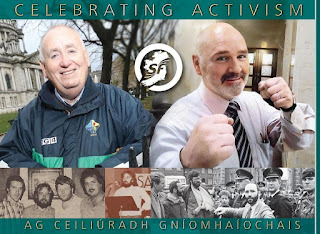
Prison Book Ban lifted
Last week I wrote a piece about books and the prison system here. That literary ramble through our penal institutions was triggered by news that some books by republicans are banned from the prisons here. Pat Sheehan MLA, a former prisoner and hungerstriker, wrote to the prison authorities.
He said: “Twenty-five years after the signing of the Good Friday Agreement I find it incomprehensible that republican literature should still be censored in this way. I thought those days were long behind us.
The Irish republican analysis of our history is as valid as any other, and attempts to censor that analysis only serve to indulge the view that the prison service is politically partisan.”
In response Pat was told that an independent book review panel at Prison Service Headquarters was established some time ago ‘to ensure a decision to deny access to any publication by a prisoner could be independently reviewed. This allows a prisoner to appeal a decision and to request a review, and that has happened on a small number of occasions’.
This included ‘No Greater Love.’ That book was reviewed by the Panel and the original decision to deny access was overturned.
The Joe Cahill book is also to be reviewed and Pat has been advised that the review panel will ‘consider the current guidance on books to take into account such issues as historical context of the publication’ . This column will update you on the outcome of this undertaking. Joe Cahill would be pleased.
Brendan Behan
Last week, 9 February, marked the centenary of the birth of Brendan Behan. Behan was a hugely influential writer whose books were rooted in his working class experience and republicanism. His parents, Stephen Behan and Kathleen Kearney, were republicans. His mother’s brother - Peadar Ó Cearnaigh – was a veteran of the 1916 Rising and wrote The Soldier’s Song (Amhrán na bhFiann).
At the age of eight Brendan joined the Fianna. Later he joined the IRA. In December 1939 he was dispatched to Liverpool to identify possible targets for the then bombing campaign. In his eagerness he brought with him explosives he had personally prepared. He was arrested. Because he was aged 16 Behan was sentenced to three years in a juvenile centre. Almost 20 years later that story was told in Borstal Boy. The book was banned in the South.
After returning to Ireland he was imprisoned again between 1942-46. My Uncle Dominic was in Mountjoy with him. He told me Behan’s cell was filled with scraps of paper covered in Brendan’s writings. He was a fine poet, particularly in Irish. He also was a chronic alcoholic, at times witty and entertaining, at other times aggressive and quarrelsome. By the time he died in March 1964 aged 41 he was widely recognised as one of the best Irish writers to have emerged in the 20th century. He was given a republican guard of honour at his funeral. I am a big fan of his writing and would recommend any of his books but Borstal Boy is especially worth a read.
February 17, 2023
Moore Street Belongs to the People: Prison Books
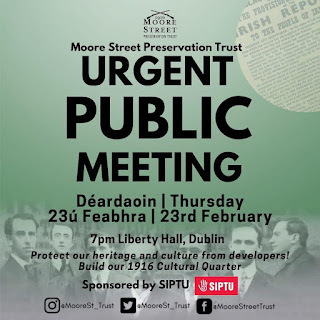
Moore St belongs to the people
The importance of the Moore Street 1916 Battlefield site was best summed up by Uachtarán na hÉireann Michael D Higgins who said: “This area belongs to no one individual, group or party. It belongs to the people”.
If you want to protect this hugely important part of our revolutionary history with its many exceptional links to the dramatic events in Dublin at Easter 1916 then support the Urgent Public Meeting being held by the Moore Street Preservation Trust in Liberty Hall, Dublin on the 23 February. Belfast film maker Seán Murray will produce a short documentary with Oscar nominated actor Stephen Rea to be launched in the Urgent Public Meeting.
The London based developer Hammerson, whose proposals would destroy much of the terrace and the significant laneways around it, and the government which supports it, believe Moore Street and its environs exist to be exploited and developed in the interests of profit. The Hammerson plans, if they go ahead, would dramatically alter the streetscape as it was in 1916, demolish much of the area, including historic and significant buildings, and overshadow the terrace 10-25 Moore Street – the last meeting place of the 1916 leaders and GPO garrison - with high rise buildings.
Three months ago Dublin City Councillors voted unanimously to add six key buildings on Moore Street, associated with 1916 to the Record of Protected Structures. According to a report prepared for the Council some of the buildings contained ‘creep holes’ that were made during the evacuation from the GPO by the fleeing Volunteers to allow ease of movement between the buildings on the terrace.
The developer, Hammerson and Associates, claimed that it would be ‘inappropriate and unlawful’ for the Council to take this decision. Dublin City Councillors rejected the Hammerson assertion saying that the Council was not prevented from adding a building to the protected structures list while planning applications are pending. The Council said that there was “long-standing and historic interest in considering the protection of 1916 buildings located on Henry Place and Moore Street.” The Council voted to give full protection to Numbers 10 and 20/21 Moore Street and partial protection to other important buildings.
Dublin Central GP Ltd (DCGP), a subsidiary of Hammerson, has lodged judicial review proceedings in the High Court against the Council. As well as accusing Dublin City Council of “inappropriate and unlawful actions “ it claimed that its objective was to “sensitively rejuvenate this historic part of the city, while ensuring its long standing traditions and important heritage can be retained and celebrated.”
This claim was dismissed by James Connolly Heron, a great grandson of 1916 leader James Connolly, and a representative of the Moore Street Preservation Trust. He described the Hammerson decision to seek a judicial review as “a breathtaking disregard for the historic importance of the last extant 1916 battleground in the city.”
The Moore Street Preservation Trust along with the Relatives of the Signatories and other groups and individuals has been campaigning to protect what the National Museum of Ireland has described as the “most important historic site in modern Irish history.”
Its importance was underlined by the High Court in 2016 which described Moore Street as unique. The Court described Moore Street as “the place to which the men and women of the GPO fled, where battle was done and surrender was negotiated, and a site where workers, civilian and combatant, lived and died in what was, to a large extent, a workers’ rising.”
From Tom Clarke’s shop on Parnell Street; to the GPO; to Henry Street where the Proclamation was signed; to Moore Lane and Moore Street where the GPO Garrison retreated; to the spot where ‘The O'Rahilly’ died; to the Rotunda where the garrison was held by the British; and where the volunteers were founded three years earlier; these are all places intimately connected to the Rising and to the men and women who participated in it.
The Moore Street Preservation Trust plan to develop The 1916- Moore Street Quarter will be presented by Seán Antóin Ó Muiri at the Liberty Hall meeting.
Moore Street and its environs are the heart and soul of the 1916 Rising. These buildings and back lanes provide a tangible link with 1916, to the courage of those who participated in it and the vision of the leaders who produced the Proclamation of the Irish Republic. But if consumerism and the rush to profit have their way the buildings and lanes around Moore Street will be obliterated.
There are no circumstances, no situation, no justification, for allowing the demolition of any part of this historic quarter. So, on 23 February if you can, get to Liberty Hall for the next stage in the campaign to develop a 1916-Moore Street Quarter. Or log on to https://www.facebook.com/MooreStreetTrust/
Award-winning filmmaker, Seán Murray, will premiere a new short-film about Moore Street at our Public Meeting! Featuring renowned actor, Stephen Rea, the film delves into the campaign to save the historic site
Prison Books
News that some books have been banned by the Prison Service in the North comes as no surprise. The books are Joe Cahill A life in the IRA. Joe would be amused. Dessie; The life and Legacy of Volunteer Dessie Grew, and No Greater Love. The Memoirs of Seamus Kearney.
The banning of these books is stupid. No accident that they are written by or about republicans. Former prisoner and hungerstriker Pat Sheehan MLA has written to the prison authorities seeking the unbanning of these titles. Good man Pat.
I love books. Ever since my Granny took me to the Falls Library when I was a wee lad I have loved books. She used to go to the library most weeks to exchange her reading material and I would potter along with her. I recall being amazed at the serried rows of shelved tomes and the quiet hush in the reading room. I quickly graduated to reading books myself. By the time I was ten I was a book worm.
That’s why I wear glasses. The first and only youngster of our clann to do so. Though all my siblings wear them these days.
A decade or so later I ended up on The Maidstone Prison Ship in Belfast Lough. I don’t recall reading any books there. We were below decks and the lighting was poor and we were on protest most of the time. We succeeded in getting the Maidstone closed down.
Later in Long Kesh the censors restricted the books permitted in to the cages. But most cages had a steady flow of reading material doing the rounds. We were internees so the rules were slightly different to the regime for remand or sentenced prisoners.
A few years later I was in Belfast Prison. It was a mad house at that time. Overcrowded, dangerous, brutal and oppressive. But it had a ‘library’. Well it had a store room containing books left by prisoners over the years. Mostly paperbacks. Thrillers and crime or cowboy novels. I read one or two books a day. There was nothing else to do. We were locked up most days. Three in a cell. My two cellmates were younger than me and they were addicted to DownTown Radio played loudly. So the daily dose of books helped me retain my sanity.
In Cage Eleven we had our own reading circle. We cancelled our food parcels for a few weeks and our ever supportive families sent us in a few quid instead. We then ordered political books from The Connolly Association in London and from old Joe Clarke in Dublin. The censor banned some books but we found ways to smuggle them in and they were devoured and analysed by a cohort of comrades including mé féin, Bobby Sands, Cleaky, Danny Lennon, Brendan Hughes, Hugh Feeney, Floorboards and other prisoners.
Later again I ended up in the H Blocks for a wee while. No books there except ‘The Bible’. As well as being well read by some, its thin pages were also utilised for rolling tobacco if cigarette papers were in short supply. We also had miniatures of republican papers smuggled in to keep us up to-date with developments outside.
Incidentally, I wrote a book while in Cage Eleven. Danny Devenny did illustrations and graphics. We smuggled it out to Tom Hartley. It was never published. But that’s another story.
February 5, 2023
The Duke of York: Bloody Sunday: Establish a Citizens’ Assembly on Irish Unity
Image of Commercial Court given to Gerry by Fr. Des Wilson
The Duke of York
The recent cold snap and the sniffles of many of my associates reminded me of when I was a young curate in The Duke of York pub in Commercial Court in Belfast in the mid 1960s. In those days a hot whiskey was the cure for colds of all kinds. In the Dukes a ‘Hot Coleraine’ was the much prized preference of hot whiskey drinkers whether they had a cold or not. But in the winter it was regularly utilised to see off the ravages of Belfast chills for all and sundry.
The Coleraine Distillery was located in the town of Coleraine. Distilling had been going on in Ireland since the seventeenth century. The distillery was converted from an old mill in 1820. In 1845 it was the whiskey of choice of the London House of Commons, so “HC” was put on the labels of its bottles. Coleraine was reputed to be one of the most meticulous distilleries ever. No whiskey was bottled under 10 years old.
The distillery was eventually bought out by Bushmills and production continued until 1978. Coleraine Whiskey is still available today courtesy of Irish Distilleries.
Coleraine was not the only commodity sold by us in the Dukes’ for the pleasure of those who were fond of a wee drink. And this column is not an encouragement to drink. It can be a curse if not contained. Moderation is the watchword. The Duke of York prided itself on the moderation of its customers and its stock of fine liquor. This included liqueurs with fine flavours, from coffee to almond to lemon, orange or mint. Some were used for medicinal purposes or as ‘a hair of the dog’. That’s a very important medicine . It saved many lives. Otherwise these potions were part of little concoctions constructed purely to tickle taste buds and liberate the imagination. Alongside fine brandies and rums,there was tequila and other rarer alcohol. From real Russian vodka imported from the USSR by our intrepid boss wee Jimmy Keaveney, to draught Barley Wine. Barley Wine is actually a beer. Draught Barley Wine is so strong customers were limited to carefully rationed servings.
The Dukes was a great place to work in. Its clientele included many journalists from The Newsletter, including Ralph ‘Bud’ Bossence, Kay and Jimmy Kennedy, Mervyn Pauley, Jack Midgley and Hammie Hamilton. Trade Union officials, Labour Party and Communist Party stalwarts like Betty Sinclair, Jimmy Stewart and Edwina Stewart, Derek Peters who later helped found NICRA were regulars. Liam McMillian, Proinsias Mc Airt, Jim Hargey - republican activists - were less regular visitors and also founders of NICRA. They rubbed shoulders with writers and broadcasters like Sam Hanna Bell, John Morrow and Davy Hammond. Other singers like Jackie Fallis, Dave Scott, Terry Brown, and musicans included Leslie Bingham and Brian Lavery. Ted Furey played for us one time.
Mrs Keaveny ruled the roost with her daughter from their rooms above the Dukes. Their son and brother wee Jimmy Keaveney was the boss downstairs. The Dukes, unusually in those days, served food during the day. Mostly soup and sandwiches. But great soup and super sandwiches.
We also served coffee. My first taste of real coffee – with freshly ground beans was in the Dukes. Jimmy Keaveny taught me how to make Irish Coffees. We also bottled our own Guinness. Many pubs did that. Draught Guinness was porter slowly drawn from firkins.
Which brings me back to Hot Coleraines. Jimmy Keaveney used sugar. I use honey. Here is my receipe. Put a tea spoon in a suitable glass. Heat the glass with boiling water. Discard this water but keep the teaspoon in the glass. Then add a good go of Coleraine whiskey and top it up with more boiling water. Ditto with the cloves, lemon and honey. But do not stir. Leave that pleasure to the drinker as s/he savours the healing vapours of this elixir. Sip. Enjoy.
Sláinte
Bloody Sunday
Last Monday – 30 January - was the anniversary 51 years ago of the deliberate murder of 14 Derry civil rights marchers by the British Parachute Regiment in Derry.
Following Bloody Sunday the British Widgery Inquiry blamed the organizers of the march, the victims and the IRA. Widgery accused the dead of being ‘gunmen and bombers’. According to the British the actions of the Paras actions were legal.
Martin McGuinness and I were in Guildhall Square in Derry when the Saville report was finally published in June 2010. It established that the victims were all innocent and was a vindication for the families who had campaigned for so long. It also concluded that the organizers of the march were not to blame for what happened. Saville acknowledged that British soldiers fired the first shot and continued firing without any provocation. He dismissed any suggestion that soldiers acted out of panic or fear or confusion. Their actions were “unjustified and unjustifiable”.
But Saville’s conclusions are not the end of the matter. It is clear that the report tries very hard to limit blame for what happened to the soldiers on the ground who carried out the killings. That is a fault. So too is the effort of the British government to deny families access to justice.
51 years later and the Bloody Sunday families are still campaigning. I want to commend their courage and resilience. I support the proposal from Colm Eastwood for them to be awarded the Nobel Peace Prize.
Cllr JJ Magee with new Citizens' Assembly billboard
Establish a Citizens’ Assembly on Irish Unity
In recent weeks some readers will have seen billboards calling on the Irish government to establish a Citizen’s Assembly on Irish Unity. Thousands of leaflets have also been produced.
This campaign is a natural consequence of the Good Friday Agreement which is 25 years old this year. The Agreement affords the people of the island of Ireland the democratic opportunity to decide through referendums North and South if they wish to end the union with Britain or establish a united Ireland. For the first time since partition there us a peaceful and democratic route to ending the union with Britain.
Four decades ago when republicans set our sights on a peace process there were those who said it was impossible. But it happened. There were those said that an agreement was impossible. They were wrong. There are those today who say that unity is impossible. They also are wrong. Unity will happen by united Irelanders staying united, cohesive, strategic and active. By us reaching out to others. By those who want unity working intelligently and winning people, including northern Protestants and others, over to the potential of Irish unity.
The Citizens’ Assembly is a key step in this process of persuasion. It is an important mechanism for democratising the debate on the future. In the last decade Irish governments have held several successful Citizens’ Assemblies. These helped deliver marriage equality and the repeal of the 8th amendment. The reality is that the Irish government is against the unity referendums and consequently has rejected the Citizen’s Assembly proposal at this time.
The establishment of a Citizens’ Assembly is of crucial importance in preparing the way for the unity referendums. It will deliberate on the integration of public services; the all-island economy; culture, rights and identity, and the shape and form of new democratic institutions.
West Tyrone MP Órfhliath Begley
The public debate around ending partition and achieving Irish unity is now mainstream and one of the most important discussions in our society at this time. A Citizens’ Assembly is the democratic exercise of the right of citizens to have their say on their future. Professor Brendon O’Leary, in his recent book ‘Making Sense of a United Ireland’ writes; “The need to prepare for the possibility of reunification affects all on this island and it affects our diasporas. This book is a call for effective preparation, accurate information and informed judgements. How will reunification happen – if it does? And how should it happen, so it can happen as well as possible.” Professor O’Leary is right. The Irish government needs to plan for the future not ignore it.
January 29, 2023
TREES: ‘THERE IS NOTHING GREATER THAN FREEDOM': THE DEMOCRATIC PROGRAMME OF THE FIRST DÁIL
TREES.
I want to recommend that you make friends with a tree. Any tree. Pick one in your local park or glen or up on a mountain. Get up close and friendly with it. Or admire the very welcome trees now being planted along our urban roads and streets. Make friends with one of them. And you don’t have to be monogamous. You can love lots of trees. In lots of places.They come in all shapes and sizes. All produce seeds. Some have berries, bright and attractive. Most of them are older than us. In the Irish tradition some trees are sacred. They ward of evil spirits. Or bring good luck. They provide shelter. Some are ancient. They have wisdom. They are holy.
Of course it’s better if you have a garden or a bit of ground to plant your own tree. It’s even better if you grow it from seed. Seeds are there for the picking up anywhere trees are growing. Just plant them. And if you are landless put them in pots. It’s nice to see them taking root and producing little shoots. Some will be happy for years in a pot as long as you keep upsizing the pot in keeping with the size of your tree. But I appreciate that not all of us can have our own tree on our own patch of earth. So it’s good if you can but not the end of your relationship with trees if you can’t.
The main thing is to be aware of them. Even on its own a tree can make the landscape. At this time of the year many decidious trees are bare. No leaves. Except for the mighty Beech. But there is a beauty in these skeletal growing things standing proud against the skyline and stretching their limbs heavenwards, secure in the knowledge that soon they will be clothed in green leaves.
I love the expectancy and promise of Irish winters. Yes it can be dark and downcast and dismal outdoors but it won’t last long. Be sure of that. There is already a grand stretch in the evenings. And it’s still January. Look at our hedges or the tree lined motorways. Now they are stark and naked. But in a month or so they will start to change. Wee buds will emerge. Then before we know it boughs will be in full leaf. Trees are home to our squirrels and other little animals. Soon they will emerge from hibernation.
Trees are home also for our birds. Our landscapes will once again be green and alive with lush emerald colours and alive with the chitter and chatter and music of birds.
Enjoy the Winter. It too will pass. Soon it will be Spring.
I am minded of the optimistic words of Ho Chi Minh.
‘Without the cold
And desolation of Winter.
There could not be the warmth
And splendour of Spring. ’
This is the season for planting trees. Any month with an ‘r’ for bare rooted saplings. Or any month for pot grown yokes. Wee whips won’t need stakes. Bigger ones will. Avoid the frost of course. And plant native trees. They will encourage native insects,bugs and other creepy crawlies and these will sustain native birds. And other animals. As well as playing constructive roles in the natural world.
I prefer decidious trees to conifers. We have too many conifers. Dark, light blocking,unchanging blanket plantations. Decidious are more interesting. Native species are essential for our natural world. We need more of them. Everywhere.
Trees will provide homes and food for bees and butterflies or flutterbys as I and the little people in my life call them. Trees clean the air. A walk among trees is good for us. A solitary tree is a thing of beauty. Be friends with it. A hug is very therapeutic. G’wan hug a tree. Nobody is looking. The tree won’t tell on you. And you will feel better.
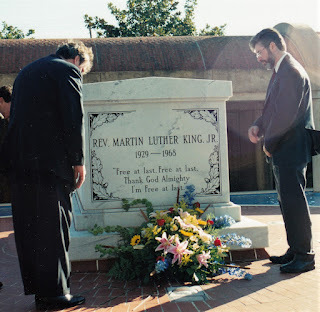
‘THERE IS NOTHING GREATER THAN FREEDOM'
Martin Luther King’s birthday is on 15 January. Each year since 1986 the USA has celebrated the life and legacy of King with a national public holiday.
In 2001 I had the good fortune to visit Atlanta in Georgia where Martin Luther King was born and where he spent much of his life preaching. Atlanta was at the heart of the Civil Rights struggle and I had the opportunity to sit quietly in Ebenezer Baptist Church where he preached his first sermon at the age of 17.
A short distance away is the King Centre with its impressive Visitors Centre and Dr King’s tomb. He was shot and killed in April 1968. Coretta King is buried next to her husband. Like him she was a dedicated champion of civil rights for over 40 years and after her husband’s death Coretta carried on the campaign for equality and justice right up until her death.
I took the time with Larry Downes, who was then President of Friends of Sinn Féin, and Ted Sullivan from Atlanta to pay our respects and lay a wreath.
Dr King was a visionary leader but he wasn’t naïve. In August 1967, just seven months before his murder, King said: “I must confess, my friends that the road ahead will not always be smooth. There will still be rocky places of frustration and meandering points of bewilderment. But difficult and painful as it is we must walk on in the days ahead with an audacious faith in the future.”
60 years later his efforts and those of millions of others have brought about enormous change in American society but intolerance, racism and inequality still exist. The work is not finished.
Similarly, in the 25 years since the Good Friday Agreement there have been many positive and fundamental changes in the North. Ireland today is in a process of transition. A lot of the old conservative influences have been weakened and progress has been made. But it is equally clear that there is still huge resistance to change. So, our task is to get the job done. To finish the journey. To have faith in the future and in our ability to build a new, shared Ireland.
As Martin Luther King said in 1956: “There is nothing in all of the world greater than freedom.” He was right.
THE DEMOCRATIC PROGRAMME OF THE FIRST DÁIL
21 January 1919 was a day of firsts. It was the day the first shots were fired in the Tan War at Soloheadbeg. It was the first day those TDs elected in the December 1918 election met in the Mansion House as the first Dáil Éireann. And it was also the first ever democratically elected Parliament in Ireland. Lá stairiúil a bhí ann.
The First Dáil was the moment the Irish people democratically asserted our desire for sovereignty from the British Empire. Just over a century later of the three texts presented to the Dáil that day the Democratic Programme is as relevant today as it was then.
Reflecting the language of the Proclamation of 1916 the Democratic Programme declared “the right of the people of Ireland to the ownership of Ireland” and called on the Government of the Republic “to make provision for the physical, mental and spiritual well-being of the children, to secure that no child shall suffer hunger or cold from lack of food, clothing, or shelter, but that all shall be provided with the means and facilities requisite for their proper education and training as Citizens …” And to “safeguard the health of the people.”
100 years later and none of this has been achieved. In the South over 3,000 children are homeless. There is a health crisis clearly evident in the appalling scenes in hospital emergency departments and a housing crisis that the FFFGers refuse to tackle.
It’s time to deliver the promise of the Democratic Programme. That means ending partition and building the new Ireland.
Gerry Adams's Blog
- Gerry Adams's profile
- 29 followers


